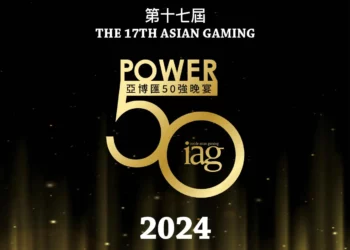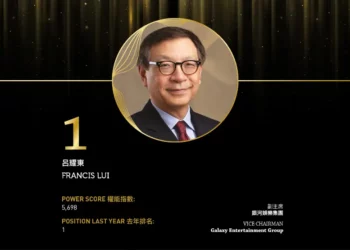[1-10] [11-20] [21-30] [31-40] [41-50]
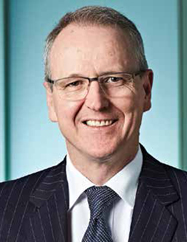
It took David Attenborough less than a week to pack up his family and relocate from Johannesburg to Sydney when first offered a role as Managing Director with Tabcorp in 2010 and barely a year to add CEO to that title. Clearly the demands of this fast-paced industry are right up his alley.
With around 3,000 employees and annual revenues north of AU$2 billion, Tabcorp is Australia’s market-leading wagering, racing, media and Keno operator with its array of brands including TAB.com.au, Keno, Luxbet, Tabcorp Gaming Solutions, Sky Racing and Sky Sports Radio.
There are casinos in the mix too (namely The Star in Sydney, Jupiter’s on the Gold Coast and Brisbane’s Treasury) although they are no longer on Attenborough’s direct radar – his first task upon arriving six years ago was overseeing a demergerof Tabcorp Holdings’ casino operations from its wagering andracing businesses.
Since then the priority has been very much about shoring up the company’s long-term position in an increasingly competitive market. While revenue has risen slightly over the past two fiscal years to AU$2.19 billion in 2016, Tabcorp says it has been actively expanding its digital presence – most notably via the upcoming launch of online sportsbook Sun Bets in the UK. A revenue sharing deal with media giant News Corp, Sun Bets has Britain’s lucrative AU$7 billion online betting market in its sites.
Back home, Tabcorp has this year extended its partnership with the Victorian Racing Club – home of the Melbourne Cup – for another eight years and its NSW Keno license throughuntil 2050.
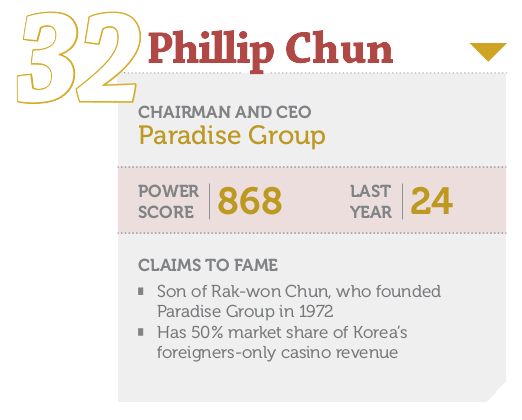
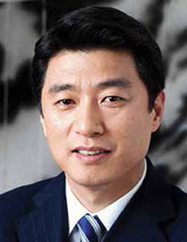
This is an interesting time for Paradise Group. The dominant player in Korea’s foreigner-only casino market, their five properties accounted for roughly half of the annual revenues brought in by all 16 combined in 2015.
Yet there remains an enormous amount of uncertainty about just what the future holds. In a perfect world, the government would overturn legislation that bans locals from gambling in all but one remote casino, Kangwon Land, which last year contributed US$1.7 billion of Korea’s total US$2.8 billion gross gaming revenue. But 11 years after taking the reins from his father in 2005, Paradise Chairman and CEO Phillip Chun knows not to hold his breath for that one.
Instead, his eyes are firmly planted on April 2017 when the company’s US$1 billion Paradise City development will open its doors. A joint venture with gaming machine manufacturer Sega Sammy Holdings, Paradise City – located next to Incheon International Airport on Yeongjong Island – will be Korea’s first integrated resort and feature a five-star hotel, convention center, hallyu-themed K-Plaza, indoor theme park, restaurants and a luxury spa.
The gaming floor, with 160 tables, 385 electronic tables and 350 slot machines, will also dwarf any of the country’s other foreigner only casinos – although it is the lack of locals that could once again restrict potential.
Where Chun hopes to strike gold is northern China. Paradise City is the first of three IRs that will be up and running in Incheon by 2019 – the theory being that northern Chinese who previously travelled to Macau will now have a viable alternative on their doorstep. Time will tell if its boom or bust.
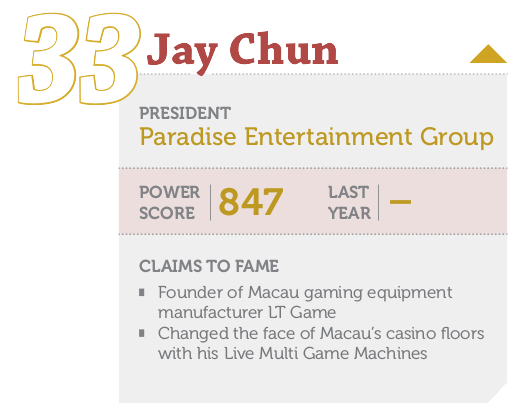
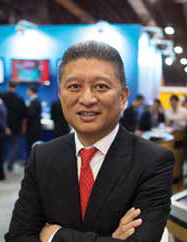
At a touch under 30 square miles, Macau is far from a continental giant. Yet few have managed such widespread influence as Paradise Entertainment’s Jay Chun.
A man with many hats, Chun was appointed Chairman of Paradise – of which he owns a 59% stake – in 2002 where his day to day responsibilities include managing Macau’s Kam Pek Paradise Casino and the Macau Jockey Club.
Since then he has founded or chaired a number of industry bodies – most recently the Macau Gaming Equipment Manufacturers Association (MGEMA) which aims to promote the interests of equipment manufacturers.
Chun is also the man behind the MGS Entertainment Show (formerly Macao Gaming Show), which celebrates its fourth year in November.
However, it was a simple observation he made during the early days of liberalization that would change the face of gaming floors across Macau. Noting the incredible pace with which new casinos were being built, Chun came to the conclusion that a dealer shortage in Macau was inevitable and from here the concept of Live Multi Game Machines was born.
Featuring a single live dealer surrounded by dozens of individual betting terminals, Live Multi Game Machines also provided a solution to the government-imposed table cap.
An instant hit when the first machines were rolled out under Paradise subsidiary LT Game in 2008, Live Multi Game has gone on to revolutionize Macau’s casino industry with the number of individual terminals now spread across the city upto 3,800 and counting.
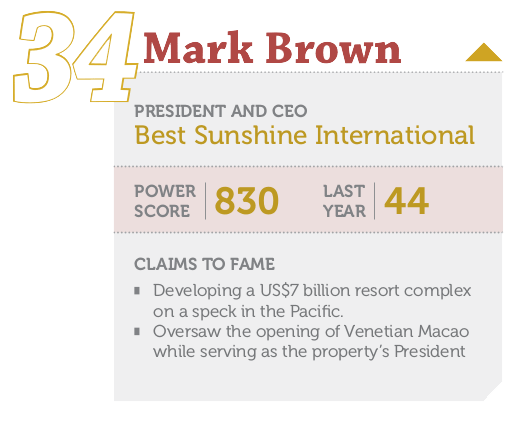
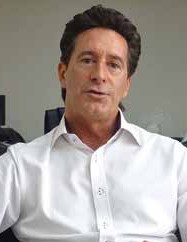
Building a multi-billion dollar casino resort on Saipan, five hours from anywhere, seemed ridiculous when Best Sunshine won the casino license in 2014 on the largest island in the US Pacific territory Commonwealth of Northern Marianas Islands. But with visa-free entry for mainland Chinese, former heavyweights from Macau junket promoter Henghseng Group behind the scenes, and, since November 2014, Mark Brown at the helm, Best Sunshine has built casinos, cash flow and credibility.
Mr Brown, an American with substantial US and Asia experience – he opened Venetian Macao in 2007 – speaks the language in Saipan. He found a site in the main tourist hub for Best Sunshine, part of Hong Kong listed Imperial Pacific International Holdings, to build the 300 room Imperial Pacific Resort, opening early next year. He identified a government-owned plot 20 minutes to the north for “our version of the Cotai Strip with 11 hotels and 9 casinos,” Mr Brown says, and negotiated with the current leaseholder to leave Best Sunshine as the sole bidder for a new lease. Imperial Pacific has also added former US CIA Director James Woolsey to its board of directors and created an advisory board with two former US state governors and ex-FBI Director Louis Freeh, who investigated Kazuo Okada for Wynn Resorts.
Most immediately impactful, Mr Brown won approval for a “temporary casino” to train future resort staff. It began operations in July last year and added VIP play in November. Through the first half of this year, its 48 total tables and 144 slots generated US$714 million in EBITDA and averaged US$2.1 billion monthly roll on no more than 16 VIP tables. After rolling US$3.2 billion in May, the company declared that, until the new facility opens, VIP operations were “saturated.” Not a problem many casinos face these days.
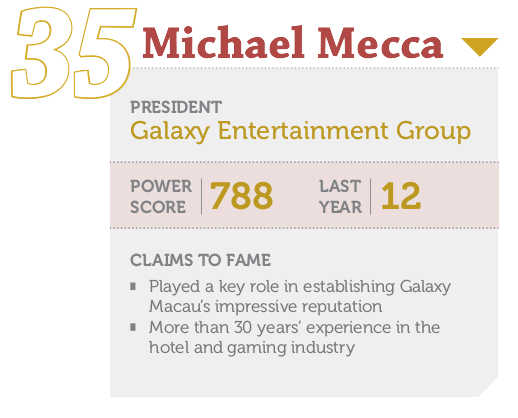
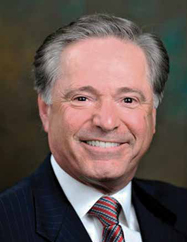
Having relinquished his position as Chief Operating Officer late last year, Galaxy Entertainment Group President Michael Mecca’s focus has shifted away from Macau somewhat and onto the company’s growing overseas portfolio.
But that’s not to suggest he isn’t still a vitally important cog in the Galaxy machine. For starters, it was Mecca who built Galaxy Macau’s renowned service-based culture through its first four years of operation – a key factor in the property’s success since opening in 2011.
More importantly, Mecca continues to have a significant say in GEG’s strategy which in recent times has seen their Macau properties shift towards the mass market.
As a result, Galaxy claimed the largest slice of market share in the first half of 2016, leapfrogging both Sands China and SJM with group revenue of HK$25.5 billion. Galaxy Macau accounted for HK$18.5 billion of that, representing an 8% year-on-year rise.
Encouragingly, non-gaming jumped by a massive 45.6% following the opening of Galaxy Phase 2 and Broadway in May 2015.
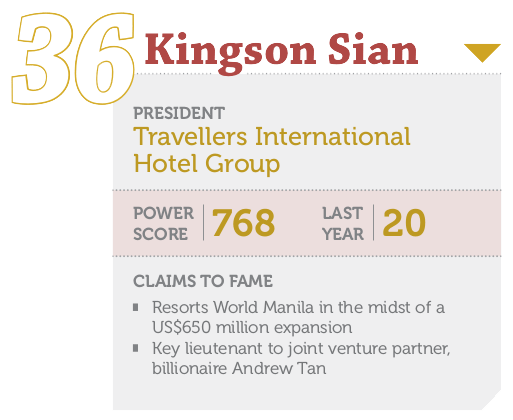
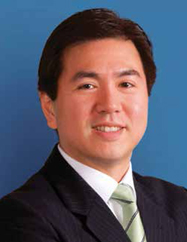
Resorts World Manila broke the mold in the Philippine capital, introducing the integrated resort model in 2009. RWM doubled Philippine gaming revenue, proving the market wanted a casino experience superior to government owned Pagcor and highlighting Manila’s potential as an international gaming destination. Now RWM risks becoming a victim of its own success by inspiring new IRs in Entertainment City.
Located near the airport and well served by the road system, RWM is a joint venture of Genting Hong Kong and Alliance Global, part of self-made billionaire Andrew Tan’s consumer goods conglomerate listed on the Philippine Stock Exchange as Travellers International Hotel Group. Already with 1,200 guest rooms in three hotels, a shopping mall, major nightclub, cineplex and concert hall, plus 310 gaming tables and 1,900 electronic gaming positions, RWM isn’t standing still. A 227 room extension of its Marriott opens this month – part of a US$650 million investment program that will add three more hotels, plus new gaming and retail areas.
Still, Manila’s center of gaming gravity appears inexorably shifting to Entertainment City, home of market leader Solaire, City of Dreams Manila and soon, US$2 billion Okada. In the second quarter, RWM’s gaming revenue grew 9.1% to P6.2 billion – a distant second to Solaire though still nearly double that of CoD Manila. RWM EBITDA rose 42% to P1.6 billion mainly because it retreated from the low margin junket trade as Entertainment City resorts aggressively pursue VIPs. Travellers has the fourth and final IR license for Entertainment City, its commitment to build a US$1.1 billion resort there extended to the end of 2020. Kingson Sian will have a lot to say about how Entertainment City fits into Travellers’ future.
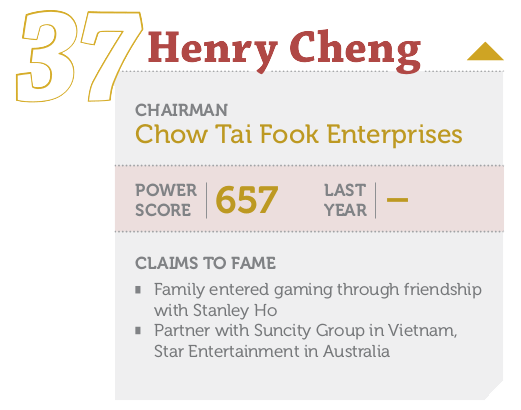
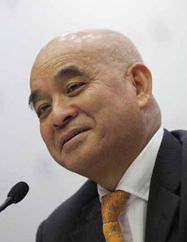
Family patriarch Cheng Yu-tung bought a 10% stake in Stanley Ho’s Sociedade de Turismo e Diversoes de Macau (STDM), the investment company that controls Macau casino operator SJM Holdings, to rid his friend of an unwanted business partner. As he’s taken control of the family’s multibillion dollar jewelry to ferry to property empire from his elderly, ailing father, Henry Cheng has extended its foothold in Asian gaming.
Last year, privately held Chow Tai Fook Enterprises revived the US$4 billion Hoi An South integrated resort initiative in Quang Nam province along Vietnam’s central coast, replacing Genting Group as the long dormant project’s majority partner alongside local investor VinaCapital and Macau junket market leader Suncity. Vietnam’s Prime Minister Nguyen Xuan Phuc, a Quang Nam native, attended the groundbreaking in April, an unprecedented gesture of political support in a market that bans local play. A new casino law, drafted this year but likely far from enactment, is expected to allow restricted local play at a selected casino; Hoi An South, expected to open its US$500 million first phase in 2019, is a hot favorite.
In Australia, Destination Brisbane led by Star Entertainment with Chow Tai Fook and Far East Consortium as partners won the bid for Queen’s Wharf. CTF’s database of high net worth Chinese from its jewelry and hotel chains is expected to drive Asian business to the US$3 billion IR.
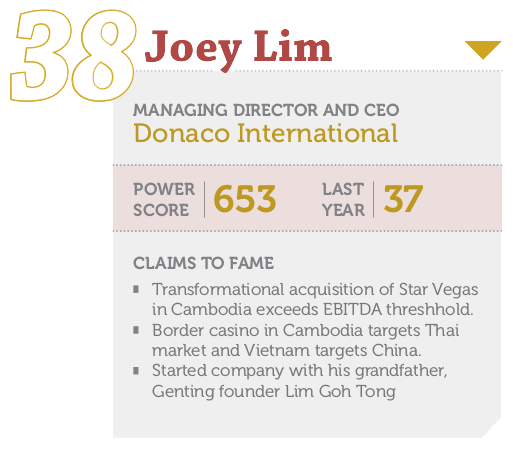
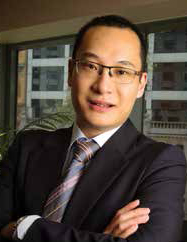
Joey Lim rolled the dice on Star Vegas in Cambodia, and in 2016, he made his number.
Australia listed Donaco paid an eye-popping US$360 million for Star Vegas casino in Poipet, on the border with Thailand. Donaco’s purchase, closed on 1 July 2015, dwarfed its existing casino hotel Aristo International on Vietnam’s border with China’s Yunnan Province, and the acquisition came with a three year guarantee of US$60 million in annual EBITDA.
For its first year under Donaco, Star Vegas’ property EBITDA reached the target at US$63.3 million, growing 22% in the Thai baht terms, the main currency used at the complex with 139 tables, 1,566 machines, 385 guest rooms, a sports bar and book, plus restaurants and duty free shops. Donaco launched and reportedly canceled a deal with Macau junket Hengsheng Group to import VIPs but has a deal to expand its Thai VIP business.
At Aristo, revenue grew 36% to AU$23.2 million (US$17.6million). EBITDA increased by 62% in local currency terms to A$11.7million. The property, upgraded two years ago to 40 tables 58 EGM positions and 400 hotel rooms, is moving away from volatile VIP playand increasing non-gaming revenue.
Still, Star Vegas represents 84% of Donaco’s FY16 revenue and 85% of EBITDA. It’s precisely the kind of niche play Mr Lim and his late grandfather, Genting founder Lim Goh Tong, had in mind when they founded Donaco.
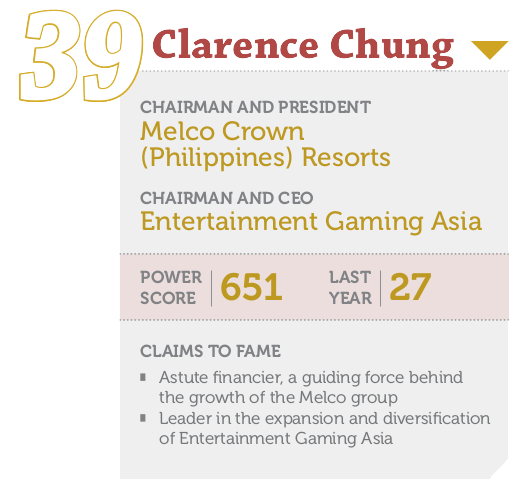
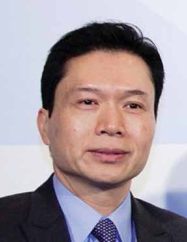
City of Dreams Manila has emerged as one of the truly positive stories for Melco Crown Entertainment and it’s been Clarence Chung, chairman and president of Melco Crown (Philippines) Resorts, who has seen the company’s first foray outside Macau through its growing pains to a point where CoD Manila is now a major contributor to Melco Crown’s performance, credited in the second quarter, just 18 months since its opening, with driving a 17% increase in company revenues. An investment banker by profession, Mr Chung was recruited by a fledgling Melco in 2003 as CFO and has since served in a decision-making capacity with every major company of the group. He helped shepherd Melco Crown to successful IPOs on the Nasdaq and Hong Kong stock exchanges and sits on the listed company’s board, and he’s an executive director of Lawrence Ho’s principal investment vehicle, Hong Kong-listed Melco International Development. He is perhaps equally well-known as chairman and chief executive of Nasdaq listed Entertainment Gaming Asia, a diverse group majority-owned by a subsidiary of Melco International with holdings in machine gaming and casino operations that has expanded under Mr Chung’s leadership into casino currency and supplies and is pushing now into remote gaming with a free-to-play mobile app targeting the pan-Asian market.
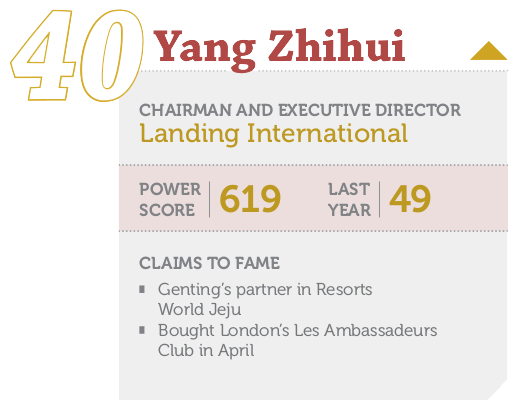
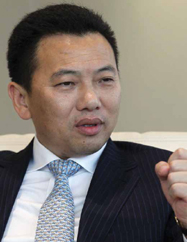
Landing International’s Chairman and controlling shareholder Yang Zhihui is making good on his goal for the Hong Kong listed mainland China property developer “to establish its own branding and presence in the gaming industry.” Landing now has casinos on two islands popular with mainland Chinese, plus a share of the largest integrated resort planned for South Korea.
Captivated by a 2002 visit, Mr Yang outbid multiple Korean companies for a 260 hectare (642 acre) development site on the southwest end of Jeju, South Korea’s top domestic tourism spot that offers visa-free entry to mainland Chinese. Landing partnered with Genting for what’s now US$1.8 billion Resorts World Jeju, with a theme park and condos – potentially a path to legal residency – plus a casino and 2,000 hotel rooms, expected to open in phases starting next year.
As insurance against licensing problems, the partners each spent US$117 million to buy and refurbish the casino at Jeju’s Hyatt Regency, rebranding it Genting Jeju. When licensing anxiety evaporated last year, Landing bought Genting’s half of the property and now runs the 33 table, 30 machine property as Landing Casino. For the first six months of this year, gaming revenue reached US$30 million.
In April, Landing announced the purchase of Les Ambassadeurs Club, with its two centuries of history in London’s swanky Mayfair district, for US$212 million. Landing immediately raised club dues, targeting Chinese high rollers frequenting London for business or visiting children attending UK schools. Acquiring Les Ambassadeurs “symbolizes our business breakthrough beyond Asia, striving to gain global presence in the industry,” Mr Yang says, suggesting Landing has only just begun that quest.
























